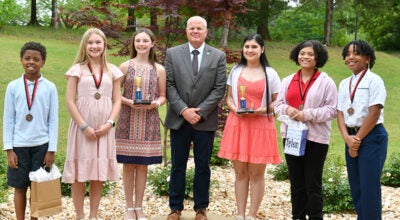Rain slowing prescribed burns
Published 6:00 am Tuesday, February 25, 2020
|
Getting your Trinity Audio player ready...
|
WEST POINT — The lingering rainy weather is hindering the West Point Project in its annual effort to cut some timber and have some prescribed burning on the lands surrounding West Point Lake.
“The rain has been setting us back,” said Danny Blankenship, a park ranger with the West Point office. “The humidity has to be lower than 40 percent for us to do any burning. We try to start this every January and go until the first few weeks of April. We haven’t burned a single acre this year. We can’t burn when it’s wet. It will take several days of dry weather before we can get started.”
“We’ve been trying to cut some timber as well, but the loggers haven’t been able to get in there,” Blankenship added.
“We usually cut around 600 acres each year. We have the bids out, but our loggers have been waiting for the land to dry out.”
Park Ranger Derrick Wilkerson, who coordinates the prescribed burning program around the lake, said that this year’s scheduled burns will start once the weather conditions are favorable.
“Prescribed burning is an important forestry management tool,” he said. “The overall purpose of the prescribed burns is to improve wildlife habitat, improve forest health and to reduce wildfire risks on public property.”
Each winter season, the Corps of Engineers at West Point Lake works with the forestry commissions in Alabama and Georgia to conduct controlled burns on West Point Project lands.
“A total of more than 1,800 acres of public land are included in our burning plan for 2020,” he said.
This year’s areas for prescribed burning on the Alabama side of West Point Lake include Hardley Creek Park, the West Lake hunting area, Amity Park campground, the Oakland Road hunting area and the Stateline hunting area.
The areas on the Georgia side include the R. Shaefer Heard day-use area, Maple Creek hunting area, Whitetail Ridge hunting area, Holiday campground, Indian Springs, Horace King Park, Liberty Hill Park and Clark Park.
The Corps conducts prescribed burning for several reasons:
(1) The fire removes accumulated fuels such as pine straw, leaves and dead vegetation, thus reducing the risk of intense wildfires.
(2) Prescribed fires improve natural forest conditions by promoting seed germination, flowering or sprouting of native plants, and
(3) burning the forest and understory plants improves the forage quality and quantity for wildlife such as deer, turkey, quail and other bird species. New shrub, herb and grass sprouts capture the quick flush of nutrients into the soil after a fire and are often more nutritious and palatable for wildlife than older plants.
For more information, contact the West Point Lake Project Office at (706) 645-2937 or West Point Lake@usace.army.mil.




